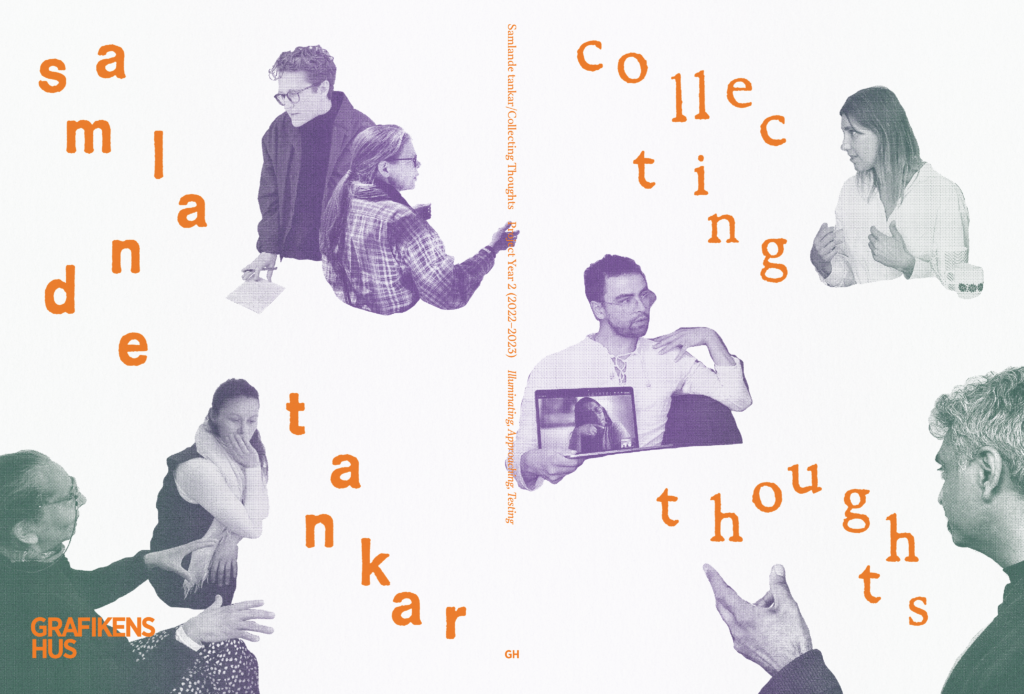
Design: Johnny Chang.
Book release: publication Year 2
The publication compiles the second year of the project and is based on works by artists-in-residence Johnny Chang and Afrang Nordlöf Malekian at Grafikens Hus, as well as yasmine eid-sabbagh’s work at the Arab Image Foundation. They explore, in various ways, “gatherings” as organizational events rather than acts of collecting. One question that the publication’s contributors address is the fact that a collection always risks marking the absence of something. Ghosts, as a concept to talk about how archives and collections exclude, reveal how these structures and systems write their own stories, where presence is marked/defined by absence.
During the release there will be a panel talk. The conversation will revolve around the conditions for acquisition and care in archives and collections, designations and categorizations, as well as the implications of a collection being absent while still claiming to exist. It will also raise the question of whether, and how, cultural organizations with archives and collections can form support systems in times of instability and crisis.
Participants include Afrang Nordlöf Malekian, Johnny Chang, yasmine eid-sabbagh, and Anneli Bäckman, with introduction by Magnus Ericson and moderation by Macarena Dusant.
The book release is a collaboration between Grafikens Hus and IASPIS, the Swedish Arts Grants Committee’s International Programme for Visual and Applied Arts.
- Date: Monday 16 september 2024
- Time: 17:30–19:30
- Place: IASPIS/Konstnärsnämnden + online
- Address: Maria Skolgata 83, Stockholm
- Language: English
- Free entrance, no registration needed
- Join online: https://us02web.zoom.us/j/84837370533
Welcome!
Anneli Bäckman is a curator based in Staare (Östersund), where she has recently joined Gaaltije Saemien Museume, a museum rooted in southern Saepmie. One of the research strands that she is currently exploring, is the relationship to various collections that reflect South Saami history, as the museum has no collection of its own. Since 2012, she has been working as a curator at Botkyrka konsthall.
Johnny Chang is an interdisciplinary and interdependent designer, artist, and researcher based in Stockholm. His practice is interested in discursive processes of sense making (and breaking)—or poetics—of visual and material culture in relation to social-historical conditions. Chang’s artistic research attends to questions of care, access, and tactics for gathering, listening to and centering knowledges that emerge from diaspora liminality, community histories, and social movement archives.
yasmine eid-sabbagh is an artist and researcher. Her practice focuses on exploring potentials of human agency by engaging in experimental, collective work processes departing from photography. These include (counter-)archiving practices such as the negotiation around a potential digital archive (re)assembled in collaboration with inhabitants of Burj al-Shamali, a Palestinian refugee camp near Tyr, Lebanon. She is a member of the Arab Image Foundation, a practitioner-led archival institution.
Afrang Nordlöf Malekian is an artist working with history’s unnoticed creators and puts history into use as a form of documentation and aspiration that calls for improbable and impossible futurities. His work examines how narratives and hierarchies disappear, return, and transform in the most unexpected ways. As an artist he has exhibited at various venues and has also curated exhibitions and programs as part of the nomadic film and culture project, noncitizen.
*
Macarena Dusant is curator and process leader for the project Samlande tankar/Collecting Thoughts at Grafikens Hus, and editor of the publication. Magnus Ericson is Head of Applied Arts at IASPIS, leading the programme in design, crafts, architecture, spatial and urban practice.